|
|
The bigoted American and Western
press naturally depicted "The Armenian Question" almost entirely
from the perspective of Armenian and WWI propaganda. But even with some of
these articles, the inconsistencies of the genocide tale slipped through;
sometimes the newspapers even released accounts of the Armenians'
belligerence.
This page will feature some of these accounts, as well as others of interest,
from the 1920s forward.
Many thanks to Gokalp.
|
|
|
| TABLE
OF CONTENTS |
1) Turks not Inclined to Remain Quiet
2) Assassination Revived
3) Ex-Armenian General Is Rich U. S. Merchant
4) Leader Of Revolutionists New President Of Republic
5) Druse Tribe Revolt Spreads
6) Death Claims Famous
General, Antranik
7) Armenian Leader Says
Communism Fight Will Go On
8) Loving Look at a Dashnak Leader in 1951
9) Antranik Made Mikoyan a Communist
10) 30 Armenians killed in helicopter
drowning
|
Turks not Inclined to Remain Quiet
|
Dunkirk Evening News, September 1, 1920, p. 7
TURKS NOT INCLINED TO REMAIN QUIET
Fighting Broke Out After Return of Commissioner From Moscow Where Treaty Was
Concluded.
Constantinople, Aug. 31— Mustapha Kemal, leader of the Turkish nationalists was
shot in the leg during an anti-national demonstration In [Tokal], according to
advices received here today.
In the same rioting Bekir Samir who recently returned from Moscow where he concluded
an alliance with the Bolshevik was shot dead. His assassin was arrested and
executed.
French troops have recaptured Urfa from the Turkish Nationalists after hard
fighting. The French were reinforced by Armenian volunteers.
|
| Assassination Revived |
Reno Evening Gazette, Jan. 26, 1921
ASSASSINATION REVIVED
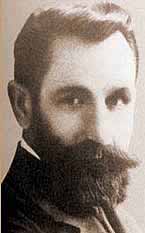 |
|
Avetis
Aharonian |
THE ATTEMPT in Paris to assassinate Avetis Abrounian, delegate for
Armenia to the nations' conference now in progress, makes one familiar with Armenian
politics ask whether the Hunchakists are still active. This was their method of silencing
their enemies within and without their organization. The reign of murder covered two
continents. In London, where the society's headquarters once had an office, there were
attempts to kill the leader. "Again there was an attempted assassination at Lausanne.
A little over fifteen years ago New York police found a Gregorian priest dead in one of
the hotels, victim of a murderer; and great mystery surrounded the case, but in the end it
was Unraveled. The priest was an agent of one of the Hunchakist factions and had brought
papers and important information for members of his faction in Massachusetts. Agents of
another faction had slain him to prevent him from carrying out his mission.
It was only a youth today who tried to kill Abrounian, but it was youths who were employed
in the dangerous work of the Hunchakists twenty years ago and later. The Armenians should
be warned. This is no way to win the respect of the powers and without it they can never
hope to stand alone.
- - - - - - - - - - - - - - - - - - - - - -
THE IMMIGRATION QUESTION
THE STATEMENT of Anthony Caminetti, United States commissioner of immigration, that all
records for immigration into this country will be broken this year, should stir the two
houses of congress into something like activity. Something must be done to prevent this
nation from being swamped by the foreign tide. Even fifty years ago the nation could
easily have taken care of a million or more new arrivals, because they would naturally
have been distributed throughout the states. Today it is different. The alien arrival
gravitates not to the fields of the West and South but to the crowded quarters of the
great cities where the Latin hears his native tongue spoken and sees himself in merely a
Latin city transported across the ocean, where the European of other races finds a similar
experience and where the process of Americanization has been choked.
We are facing a real danger. The millions of men and women of foreign birth and education
— such as it is — who have arrived within the last ten years, even, have not yet been
assimilated into the American nation. If millions more shall be added to this mass, they
never will be assimilated, never become a real part of America. Instead, American
institutions will be threatened with attack by persons who do not understand them and
never will.
Permanent barricades against good material for citizenship from foreign lands are not
wanted, but the nation needs a rest.
Holdwater: How do you like that warning to the Armenians in
the first article, to ixnay on the murder and mayhem, otherwise the powers won't give them
the time of day? Think it was effective?
The targeted Armenian was Avetis Aharonian; the name has been misspelled.
Regarding the second article, can we think of one ethnic group where their huddled and
masses were always welcomed into the United States, even though they have had the greatest
trouble with assimilating, obsessed as they were with the old country?
|
Ex-Armenian
General Is Rich U. S. Merchant
|
The Charleston Gazette, Oct. 11, 1924
Ex-Armenian General Is Rich U. S. Merchant
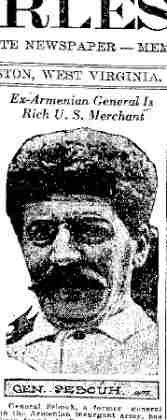 |
|
General
Sebouh
How did he get rich so fast? |
General Sebouh, a former general the Armenian
insurgent army, has been found in Boston. Mass. as a prosperous merchant. He came to
the United States in 1921.
===============
"A Remembrance of General Sebouh," by Nerses Maranjian,
from The Armenian Weekly Online, September/October 2003 tells us Sebouh (Arshag)
Nersesian (1872-1940) joined the Hunchaks in Istanbul in 1889, only two years after
their formation, only to ditch them for the Dashnaks in 1894, four years after their
formation. In Sasun, he was a leader of the "1904 insurrection." (Does
that mean "revolt"?)
As Hairenik put it in September 4, 1940, "In 1914-1915, Sebouh took part in the battles of Khoy and Dilman with
General Andranik. He was also part of the Armeno-Russian forces which liberated
Garin. At the head of the Dashnaktsakan formation, he took part in the decisive
battle of Sardarabad and later went on to help the Armenians besieged in Baku."
That means this Ottoman-Armenian betrayed his nation well before the
"genocide," and no doubt went on to participate in the mass murders of
non-Armenian Ottomans. He would write an autobiography, Echer Im Housheren (Pages From My
Memories), and would remain an active Dashnak until his death.
|
| Leader Of Revolutionists New President Of Republic |
Olean Evening Times, June 25, 1925
Leader Of Revolutionists New President Of Republic
Paris, Jum 25.- (I. N. S.)- The Michalacopulos government was deposed and General
Pangalos, leader of the revolutionists, was proclaimed the new president of the
Greek republic, the newspaper L'Independent of Salonika announced today, according
to advices to La Liberte.
The army and navy co-operated in overthrowing the government, the dispatch added.
The Greek government has been facing a political crisis for several weeks, there
having been three new cabinets within a period of two weeks.
The political situation came to a head June 10 when General Kondylis resigned as
minister of the interior. General Kondylis has a strong following in Greece as had
[M.] Michalacopulos, who was premier until today. Kondylis. In resigning, pledged
the support of his party to the Michalacopulos regime, but dispatches today would
indicate either that he began an offensive against Michalacopulos or that he was not
able to control his followers.
The resignation of Michalacopulos followed an incipient revolution of Armenian and
Greek refuges in Greece June 7. The refugee settlement committee had been building
camps at Pedarades, Byron and Kokkinea to care for Greeks and Armenians expelled by
Turkey. The Near East Relief, conducted under American auspices, has been feeding
the refugees.
On June 7 these refugees, then billeted in public buildings, rushed the camp and
took possession of all uncompleted buildings.
The refugee settlement committee reported the matter to General Kondylis but he
declined to take action. Appeal was carried over his head to Premier Mlchalacopulos
who promised the committee to restore the camp buildings to the commitee. General
Kondylis then submitted his resignation.
The people of Greece voted April 14. 1924, for the establishment of a republic.
|
| Druse Tribe Revolt Spreads |
Indiana Evening Gazette, Aug. 13, 1925
DRUSE TRIBE REVOLT SPREADS
CONSTANTINOPLE, Aug. 13.- (INS)-The revolt of the Druse tribes against French occupation
of Syria has spread to alarming proportions according to a dispatch from Adana, Asiatic
Turkey today.
Following their recent successes against French troops, the Druses defeated a battalion of
500 Armenian volunteers. French official circles fear that other tribes will join in the
movement of independence.
Reinforcements of native troops from Algiers were reported in a state of mutiny at Beirut,
the principal seaport of Syria.
|
Death
Claims Famous General, Once Of Fresno
|
The Fresno Bee, August 31, 1927
Death Claims Famous General, Once Of Fresno
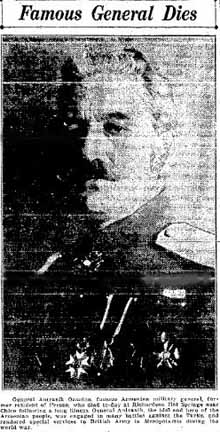 |
|
General
Antranik Ozanian, famous
Armenian military general, former
resident of Fresno, who died to-day
at Richardson Hot Springs near Chico
following a long Illness. General Antranik,
the idol and hero of the Armenian
people, was engaged in many battles
against the Turks, and rendered
special services to British Army in
Mesopotamia during the world war. |
DEATH to-day claimed. General Antranik Ozanian,
a former resident of Fresno, whose colorful military career made him the idol and
hero of the Armenian people throughout the world.
Ozanian, better known as General Antranik, leader of the Armenian military forces
during the world war, died early to-day at Richardson Springs near Chico. He left
Fresno last February to reside in San Francisco in an attempt to regain his health.
General Antranik's picturesque career reads like a romance of the medieval knights.
He was born about sixty years ago in the province of Sivas in Armenia.
Leaving his trade of carpenter in 1891 he joined the revolutionary forces in defense
of his country against the persecution inaugurated by Abdul Hamid. He was arrested
and made his escape and resumed the warfare against the Turks.
The indomitable will of Antranik was still unbroken after years of steady fighting,
and his name became a terror to the Turks and the Kurds. Eventually, he was elevated
to a first lieutenancy in the Bulgarian Army, and decorated with the Order of St.
John.
Fought Turks Only
Foreseeing war between Bulgaria and Serbia, Antranik disbanded his men, for he would
only fight against the Turks. He retired to a village In Armenia, living there as a
farmer until 1914. Receiving word, that under the Russian command, [3]00,000
soldiers would concentrate on the Turkish front and that he should recruit Armenian
volunteers, Antranik raised an army of 15,000 soldiers.
Given the rank of major general in the Russian Army, he rendered important services
in the Caucasus. He was praised by General Allenby of the English forces for his
work in the Palestine drive during the world war.
General Antranik came to Fresno after the war and directed a campaign in which he
raised $500,000 for the relief of Armenian war refugees. Going back to Europe, he
was married in Paris, and came to Fresno with his bride in 1922.
Lenders of the local Armenian colony are preparing to hold one of the largest
funerals In the history of the city in honor of the famous general, they said
to-day. Arrangements for the funeral and burial will be made following the arrival
here of Mrs. Ozanian.
Holdwater: There was no "Armenia" where the
general retired to, until 1914. He was in the Ottoman Empire as an Ottoman-Armenian.
Come 1914, he betrayed his nation, as he had done many times in the past. And
certainly his name was a "terror" to defenseless Turkish and Kurdish
villagers, knowing that Antranik was so good with his ethnic cleansing campaigns.
|
| Armenian Leader Says Communism Fight Will Go On |
The Fresno Bee, Dec.20, 1948
Armenian Leader Says Communism Fight Will Go On
Assurances the fight against Communism, which has been under way since 1920, will continue
in tiny Armenia yesterday were given an audience of nearly 1,000 by General Dro Kanayan, a
leader of the Armenian Revolution Federation.
The general, a hero to the Armenian people, was given an ovation when he appeared at a
mass meeting in the auditorium of the Fresno High School and declared:
"We, the Armenian people, resent oppression from any country or idealogy [sic], and
will continue to fight until we are completely free."
Seeks Help in US
The former head of the military in the Armenian Republic is in the United States seeking
support in the continuing fight of his countrymen against both the Communists and the
Turks.
He recalled how he signed an Agreement with Russia in 1920 for peaceful entry of Soviet
people into Armenia. Instead, he said, they violated the agreement by sending an army.
Three months later the Armenian people revolted.
"As a result," General Dro said, "the Communists sent into exile hundreds
of our intellectuals. As leader, I was taken to Moscow as a political prisoner and stayed
there for nearly five years before I was able to escape."
He related how he spent several years in France, Romania and later In Egypt directing his
countrymen's fight against the invaders. Russians, he said, still are in control of
Armenia.
Former Official Speaks
S. Vratzian, a former prime minister of the republic, also spoke. He said more than half
of the 400,000 Armenians in the United States are active members and sympathizers with the
cause of the federation.
Vratzian and General Dro will be guests of the Fresno federation at a dinner in the Hotel
Fresno Wednesday at 7 PM which will mark the fiftieth anniversary of the founding of the
group.
Yesterday's meeting was jointly sponsored by the local federation, the Armenian Relief
Society and the Armenian Youth Federation. Hasadoor Khederian was chairman.
Holdwater: So the mass murderer was leading a comfortable
life in the USA, "seeking support in the continuing fight of his countrymen against
both the Communists and the Turks." What fight was this against the communists? And
where exactly was this fight with "the Turks"? What a phony little man.
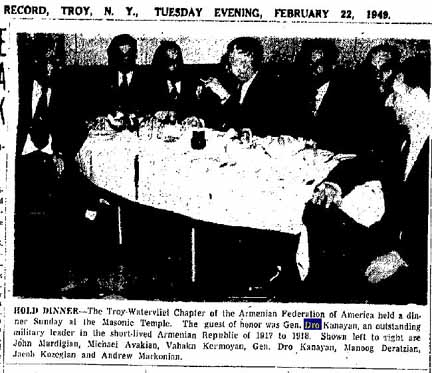
The Record, Troy, Feb. 22, 1949
HOLD DINNER — The Troy-Watervliet Chapter of the Armenian Federation of America
held a dinner Sunday at Ihe Masonic Temple. The guest of honor was Gen. Dro Kanayan, an
outstanding military leader in the short-lived Armenian Republic of 1917 to 1918. Shown
left to Tight are John Mardigian, Michael Avakian, Vahakn Kermoyan, Gen. Dro Kanayan,
Manoog Deratzian Jacob Kozegian and Andrew Markonian.
Holdwater: The years for the Armenian dictatorshi... that is, republic were actually
1918-1920/1921.
|
Loving
Look at a Dashnak Leader in 1951
|
The Vidette Messenger (Indiana), May 31, 1951
As Othman Sees It
By Frederlck Othman
WASHINGTON. — This day I have spent in a dimly lit Spanish restaurant operated by
an Armenian named Mihran Mukkasnian, plotting with some patient revolutionists.
They've been revolting now for 1,500 years against one tyrant or another, without
much luck, but they have not given up. I mean the Armenians.
May 28 was their big day. It marked the date of their first successful revolution,
when they chased out the Turks in 1918, So they set up a republic, complete with a
congress, which lasted for two years. Then came the Bolsheviks.
In 1921 the Armenians got rid of them too, and set up another democracy. which
lasted for two whole months. The Russians returned with more troops and that was the
end of Armenia as an independent nation. so the Armenians hadn't much to celebrate
on this anniversary.
Moment Is Near
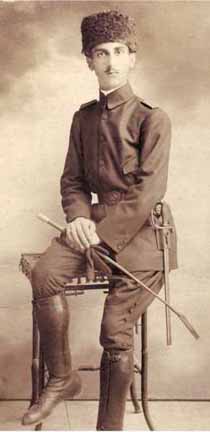 |
|
Mark
Keshishian actually served in the
Ottoman army, under Jemal Pasha!
(Does that mean not all Armenians
who served were disarmed? Hmmm!)
A loving web site by one of his sons,
fairly free if prejudice, may be accessed
at http://www.hadjin.com |
I was doing my plotting with Mark Keshishian,
who is president of the Armenian revolutionary federation in this district. He is
also a dealer in oriental rugs. The Armenian revolutionists have been in business
for hundreds of years, but they never got around to starting an official lodge until
1890. The member in Armenia long since have gone underground. They're waiting for
the proper moment to hold another revolution. Keshishian is sure that moment is on
the way.
My own part in the revolution was simple. Keshishian said all he wanted from me was
a little help in reminding the 250,000 other Armenians in the United States that
some day they're going to have a homeland of their own again.
So we got to talking about other things, such as why his distant cousin, Mihran,
should run a Spanish restaurant here, complete with tamales, flam, enchiladas and
other Latin delicacies. Keshishian said that there were so many Latins in Washington
that it looked like a good idea. It must have ben this Armenian contina has been
popular for 31 years.
I wanted to know, of course, why the Armenians had a monopoly on the rug business.
Keshishian said they used to, because the best rugs were made in Armenia, and his
ancestors sold them all over Europe. Lately many others have gone into rugs and
carpets, too, and the problem now is the price of wool.
Up 400 Percent
This has gone up 400 percent since 1948 and a lot of people who had saved up to buy
rugs find they didn't save enough. Many synthetics are now going into carpeting.
Fact is, Keshishian at the moment is carpeting the entire house of a prominent
Washingtonian with cotton. This looks luxurious and it didn't cost nearly as much as
wool, but Keshishian wishes he'd been able to talk the man's wife out of it. He's
got nothing against cotton for carpets, you understand, but he figures the lady may
fret when she discovers how hard it is to put a rug 30 feet long into a washing
machine.
Wool is best, say's Washington's top revolutionist. Wool rugs made in Armenia are
best of all. This is because they are tied with gordian knots. The harder they're
pulled the tighter they become.
One other thing. The Armenians in America are celebrating their 60 days of
independence with picnics, featuring lamb roasted in grape leaves.
"Very modestly," said Keshishian, "as befits a very modest kind of
revolution.
Later on, maybe, he hopes, the revolt of history's most patient revolutionists will
get rid of those communists, who have been oppressing his native land now for more
than a quarter of a century.
Holdwater: Note how in the "Dro" article
above, the Armenians in the USA numbered 400,000 in 1948. Here, in 1951, the number
has dropped down to 250,000.
|
| Antranik Made Mikoyan a Communist |
Sunday Gazette Mail, Apr. 18, 1965
ABOUT FACE
Sharp Slap Said Reason Mikoyan Now Communist
By David Lancashire
BEIRUT, Lebanon —UPI— Anastas I. Mokoyan, president of the Soviet Union, became
a Communist because of a slap in the face 50 years ago, according to Simon Vratsian,
last prime minister of independent Armenia.
Vratsian headed the committee which commanded Armenian volunteers, allied with the
Czarist Russians in World War I, and Mikoyan for a time was his personal aide.
Mikoyan in those days was a member of the Armenian Dashnag Revolutionary party, a
nonleftist nationalist group.
"I remember Mikoyan very well because he worked directly under me for several
weeks in 1914 or 1915," Vratsian recounted in an interview. Mikoyan would have
been 19 or 20 then and "He did all sorts of odd jobs, even carrying messages
for me."
"Mikoyan was a good boy — very bright and intelligent, and very calculating.
"Then I sent him off to the front to fight against the Turks with the Armenian
volunteer group led by Ozanian Antranik.
THE ARMENIANS were forced to retreat and during the retreat — for reasons I don't
know — Mikoyan and Antranik began to argue. Antranik beat him — slapped him in
the face.
"Mikoyan quit the Dashnag movement on the spot, left the volunteers and
enrolled in a seminary at Etchmiadzin, and then went to Baku where he eventually
joined the Bolsheviks.
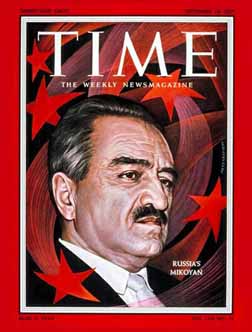 |
|
Russia's
Mikoyan |
"The Bolsheviks sent him to Stalin, who
saw that he was good material and had him trained as a Communist. I never saw
Mikoyan again.
"But I know Mikoyan isn't a good boy any more. Nobody who worked under Stalin
for years could emerge as a good man."
Antranik, the partisan leader whose slap changed Mikoyan's political convictions,
was a legendary Armenian leader who led the 1st Armenian Battalion in Russia and
died in California in 1927.
Vratsian, who told the story, is now an 83-year-old school teacher and principal in
Beirut. His memories and historical works are used internationally as text books on
the Armenians.
|
| 30 Armenians killed in helicopter drowning |
The Capital, March 4, 1992
30 Armenians killed in helicopter drowning
AGDAM, Azerbaijan (AP) — Police say they have recovered the bodies of 120 Azerbaijanis
killed as they fled an Armenian assault in Ngorno-Karabakh, and commonwealth troops have
halted their pullout from the disputed region.
In the mounting violence, 30 Armenian women and children died late yesterday in the
downing of a helicopter evacuating them from Stepanakert, capital of the mostly Armenian
enclave inside Azerbaijan, Armenian officials said.
Armenian officials in Moscow yesterday denied as a “gross exaggeration” a claim by
Azerbaijan’s president, Ayaz Mutalibov, that 1,000 Azerbaijanis were massacred in the
Armenian assault last week on Khodzhaly.
The town of about 7,000 where the alleged massacre occurred is a few miles from Agdam, an
Azerbaijani city on the border of Ngorno-Karabakh.
Videotape broadcast yesterday by commonwealth television and ABC-TV showed the bodies of
dozens of victims, including women and children, scattered on hillsides outside Khodzhaly.
Azerbaijani men with Kalashnikov rifles slung over their shoulders sobbed as they
collected the bodies, some of which had been mutilated.
A police official who would not give his name said yesterday they were among 120 corpses
recovered from the rolling hills in Nagorno-Karabakh.
Holdwater: Note that even though the accent is on the Azeri
victims, the headline stresses Armenian losses; the biased writer even chooses to use the
word "alleged" to describe the massacre, when the news footage provided hard
evidence a massacre had occurred. In addition, the number of massacred Azeris indeed
totaled close to a thousand, and such an estimate was no exaggeration, gross or otherwise;
what was gross was the Armenians' attempt to cover up their hideous crime.
Back to the News Page
|
|